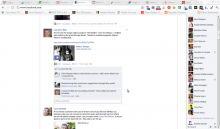Author: sgardner
Description:
How Facebook shows time and date
When I'm looking at edit histories, I often find myself wanting to know roughly how long ago someone made an edit. Mostly because I am wondering if the person is still around to talk with.
But, it takes me a split second to do the mental processing, because MediaWiki just shows time and date. By contrast, when I'm on Facebook or Twitter or many other sites, that processing is automated for me, and I see human-friendly language like "7 minutes ago," "about an hour ago" or "17 days ago."
It probably makes sense for us to continue to show time and date, but I think it would be helpful to add a notation on the changes that have taken place within the past say eight hours, noting in human-friendly language how long ago the edit was made.
The purpose of this feature request is to eliminate a little mental processing on the part of editors, by automating it.
Version: 1.21.x
Severity: enhancement
Attached:
